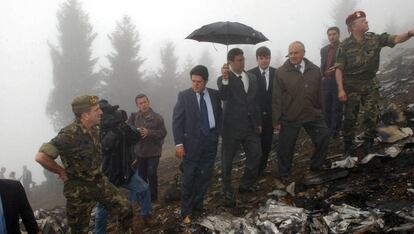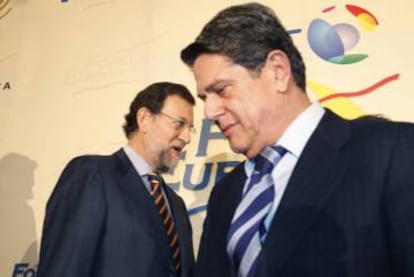Families win moral victory in saga of Spain’s Yak-42 plane crash
Council of State says Defense department knew of risks before accident in which 62 servicemen died
On May 26, 2003, a Russian-made Yak-42 military transport plane carrying 62 members of the Spanish Armed Forces back from Afghanistan crashed into a mountainside near the Turkish city of Trabzon. Over 13 years and numerous lawsuits later, the Spanish Council of State – the government’s top advisory body – has officially admitted, for the first time, to the Defense Ministry’s responsibility in the crash.

The defense minister at the time was Federico Trillo, who is now the Spanish ambassador to the UK.
The Council’s report, which is already on current Defense Minister María Dolores de Cospedal’s desk, admits to the state’s responsibility in the greatest tragedy to befall the Spanish army in times of peace.
The Council mentions a secret report relayed by Spain’s intelligence services nearly a month prior to the crash
The finding will not result in financial compensation for the relatives, but it is a tremendous moral victory after more than a decade of setbacks.
“There are facts, prior to the date of the crash, that would have allowed the administration to ponder the particular concurrent risk of the troop transport in which the accident took place,” reads the report, to which EL PAÍS has had access.
“Put differently, certain circumstances could have been noted that would have led to the adoption by the competent bodies of measures that might have removed the risk that was being run,” adds the document.
The report was unanimously approved on October 20 by the Council’s Permanent Committee, and it represents a serious blow to the Defense Ministry officials in place at the time of the crash.
In response to the revelations from EL PAÍS on Tuesday, Spain’s two largest opposition parties, the Socialist Party (PSOE) and Podemos, have called for Trillo to be removed as ambassador.

But PP Prime Minister Mariano Rajoy defended the former defense minister: “This has substantiated judicially what had to be substantiated. It took place many, many years ago,” said the prime minister from Pontevedra, in his home region of Galicia, where he was enjoying a short break.
He added that he was unaware of the existence of the Council of State report.
Pablo Casado, the PP’s deputy communication secretary also backed Trillo: “His work as ambassador is quite different to the work he performed 20 years ago. A defense minister is always concerned with security, and we are committed to the families [of the victims of the crash].”
The PSOE and Podemos have presented initiatives before Congress calling for Trillo to be removed and for the foreign minister and the defense minister to appear before deputies to answer questions.
Ricardo Cortés, the Socialists’ defense spokesman, said: “The Council of State’s report is a very serious matter and it was approved unanimously. And Trillo, as the maximum representative of the Defense Ministry at the time, should stand down as ambassador over his political responsibility.”
Pablo Bustinduy, Podemos’s foreign affairs spokesman, told EL PAÍS: “Obviously it is incompatible to represent Spain in another country without assuming political responsibility for such as serious event.”
Ciudadanos has called for Defense Minister De Cospedal to appear before Congress, but has yet to call for Trillo’s resignation.
Contradictions
The Council’s conclusions appear to contradict the fact that the High Court, Spain’s central criminal tribunal, shelved the case against half a dozen military officials, including the chief of the defense staff at the time, Antonio Moreno Barberá, on the grounds that there was no criminal accountability.
But the Council has fallen back on the High Court’s own conclusions that found “an absence of relevant penal responsibility, but not of any other kind of responsibility of a varied nature.”
Instead, the Council assigns the Defense Ministry “responsabilidad patrimonial,” or asset liability. It agrees with court decisions that found that the direct cause of the crash was the fact that the pilots were worn out after 22 hours in the air, and that they had not been properly trained to face the situation in which they found themselves.
At the time of the accident, government officials blamed a chain of subcontractors for the series of mistakes that led to the crash. But the Council now notes that the Spanish state has the obligation to inspect its contractors’ activities, especially those conducting risky activities.
The Council also mentions a secret report relayed by Spain’s intelligence services nearly a month prior to the crash, warning that “a high risk is being run by transporting personnel on cargo aircraft chartered in former Soviet countries; their maintenance is highly questionable at the very least.”
However, the Council rules out any further monetary compensation for the victims’ relatives, and considers that the outlays of the last 13 years are sufficient reparation. Defense Minister Cospedal now has the final word on the matter.
A series of errors and lies
Popular Party politician Federico Trillo’s successor at the Defense Ministry, José Bono of the Socialist Party (PSOE), pledged to find out the truth about the crash. He ordered DNA tests that found that 30 bodies had been erroneously identified. Military officials in charge of the task did not mistake the identities of the dead soldiers, but simply attributed the names of the 30 victims, which in many cases were burnt beyond recognition, ad hoc, “with deliberate intent to not tell the truth,” according to the sentence, which was subsequently ratified by the Supreme Court.
Bono also launched a probe into the network of subcontractors involved in the aircraft charter. What emerged is that of the €149,000 paid for the Yak-42, only around €36,500 went to the plane operator, UM Air. The rest was pocketed by four other subcontractors.
The Yak-42 that crashed in Turkey was not even insured properly, and the Spanish Defense Ministry had to pay out €75,000 for each death, a total of €4.6 million. The money was paid by the state, and was never recovered.
English version by Susana Urra & Nick Lyne.
Tu suscripción se está usando en otro dispositivo
¿Quieres añadir otro usuario a tu suscripción?
Si continúas leyendo en este dispositivo, no se podrá leer en el otro.
FlechaTu suscripción se está usando en otro dispositivo y solo puedes acceder a EL PAÍS desde un dispositivo a la vez.
Si quieres compartir tu cuenta, cambia tu suscripción a la modalidad Premium, así podrás añadir otro usuario. Cada uno accederá con su propia cuenta de email, lo que os permitirá personalizar vuestra experiencia en EL PAÍS.
¿Tienes una suscripción de empresa? Accede aquí para contratar más cuentas.
En el caso de no saber quién está usando tu cuenta, te recomendamos cambiar tu contraseña aquí.
Si decides continuar compartiendo tu cuenta, este mensaje se mostrará en tu dispositivo y en el de la otra persona que está usando tu cuenta de forma indefinida, afectando a tu experiencia de lectura. Puedes consultar aquí los términos y condiciones de la suscripción digital.








































